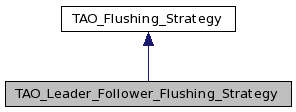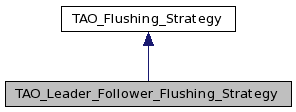Implement a flushing strategy that uses the Leader/Follower set. More...
#include <Leader_Follower_Flushing_Strategy.h>


Public Member Functions | |
| virtual int | schedule_output (TAO_Transport *transport) |
| virtual int | cancel_output (TAO_Transport *transport) |
| Cancel all scheduled output for the transport argument. | |
| virtual int | flush_message (TAO_Transport *transport, TAO_Queued_Message *msg, ACE_Time_Value *max_wait_time) |
| virtual int | flush_transport (TAO_Transport *transport, ACE_Time_Value *max_wait_time) |
| Wait until the transport has no messages queued. | |
Implement a flushing strategy that uses the Leader/Follower set.
Definition at line 32 of file Leader_Follower_Flushing_Strategy.h.
| int TAO_Leader_Follower_Flushing_Strategy::cancel_output | ( | TAO_Transport * | transport | ) | [virtual] |
Cancel all scheduled output for the transport argument.
Implements TAO_Flushing_Strategy.
Definition at line 24 of file Leader_Follower_Flushing_Strategy.cpp.
{
return transport->cancel_output_i ();
}
| int TAO_Leader_Follower_Flushing_Strategy::flush_message | ( | TAO_Transport * | transport, | |
| TAO_Queued_Message * | msg, | |||
| ACE_Time_Value * | max_wait_time | |||
| ) | [virtual] |
Wait until msg is sent out. Potentially other messages are flushed too, for example, because there are ahead in the queue.
Implements TAO_Flushing_Strategy.
Definition at line 31 of file Leader_Follower_Flushing_Strategy.cpp.
{
TAO_Leader_Follower &leader_follower =
transport->orb_core ()->leader_follower ();
return leader_follower.wait_for_event (msg, transport, max_wait_time);
}
| int TAO_Leader_Follower_Flushing_Strategy::flush_transport | ( | TAO_Transport * | transport, | |
| ACE_Time_Value * | max_wait_time | |||
| ) | [virtual] |
Wait until the transport has no messages queued.
Implements TAO_Flushing_Strategy.
Definition at line 42 of file Leader_Follower_Flushing_Strategy.cpp.
{
try
{
TAO_ORB_Core * const orb_core = transport->orb_core ();
while (!transport->queue_is_empty ())
{
// In case max_wait_time==0 we cannot simply run the orb because
// in multi-threaded applications it can easily happen that
// the other thread will run the orb and drain the queue in the
// transport we're coping with here and this thread will block.
// Instead we do run for a small amount of time and then recheck
// the queue.
if (max_wait_time == 0)
{
ACE_Errno_Guard eguard (errno);
// Poll the reactor's queue.
ACE_Time_Value tv = ACE_Time_Value::zero;
orb_core->orb ()->perform_work (&tv);
}
else
{
orb_core->orb ()->perform_work (max_wait_time);
}
if (max_wait_time != 0) {
if (*max_wait_time <= ACE_Time_Value::zero) {
errno = ETIME;
return -1;
}
}
}
}
catch (const ::CORBA::Exception&)
{
return -1;
}
return 0;
}
| int TAO_Leader_Follower_Flushing_Strategy::schedule_output | ( | TAO_Transport * | transport | ) | [virtual] |
Schedule the transport argument to be flushed If -2 is returned then the caller must call one of the flush_* methods. If -1 is returned then there was an error. If 0 is returned then the flush was scheduled successfully.
Implements TAO_Flushing_Strategy.
Definition at line 18 of file Leader_Follower_Flushing_Strategy.cpp.
{
return transport->schedule_output_i ();
}
 1.7.0
1.7.0